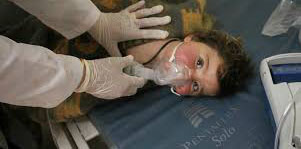Chemical attack in Syria
April 5, 2017 | Expert Insights

A suspected chemical attack on a rebel-held Syrian town has drawn widespread international condemnation, with the United Nations saying it would investigate the bombing raid as a possible war crime.
At least 72 people, including 11 children, were killed in Khan Sheikhoun, Idlib province, on Tuesday, according to the Syrian American Medical Society (SAMS), which runs several field hospitals in the area. More than 550 people were injured.
The Attack
The attack caused people to vomit and foam from the mouth. Others lost consciousness and suffered muscles spasms.
Symptoms also included constricted pupils and slow heart rate, were indicative of an organo-phosphorus compounds agent - a category of toxic gases which includes sarin.
Local health workers said the death toll could rise and eventually reach 100. A member of the White Helmets, a rescue group that operates in rebel-held areas, told that up to 300 people had been injured.
Analysis
There are many conjectures, the first being that sarin was used in the attack, which is attributed to Assad’s government. Syria's military rejected the accusation saying, the army denies using any toxic or chemical agents in Khan Sheikhoun today. Further they reiterated that they would never use it anywhere.
Russia’s claim that chemicals that killed dozens of civilians in northern Syria came from rebel weapons on the ground have been rejected.
It is intriguing why government forces would have resorted to chemical weapons when they are doing well militarily on the ground. The United Nations has urged action on Syria’s chemical attacks.
Assessment
The chemical weapons do not serve any substantial military purpose. The objective of such an attack seems to be spreading terror. The perpetrators of such a heinous act would most likely be forces inimical to the Syrian government.








Comments